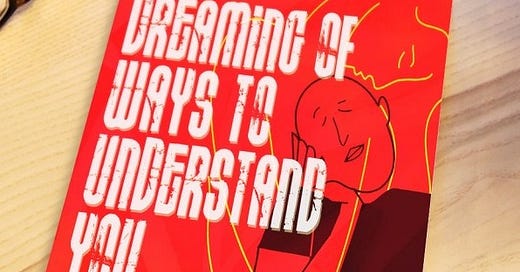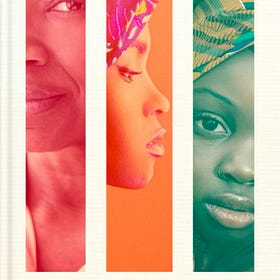#64: Me & You No Dey The Same Category
A Review of Dreaming of Ways to Understand You by Jerry Chiemeke
Dreaming of Ways to Understand You is a collection of fifteen short stories exploring the complexities of human relationships. It is written from the perspective of individuals navigating relevant social issues as they make sense of their own lives, and focuses on themes of mental health, sexuality, body positivity and domestic violence, amongst others.
Greetings, once again dear reader👋🏽👋🏽
I hope you are doing well and taking good care of yourself.
Welcome to another edition of this spectacular newsletter.
Today’s newsletter is a guest feature by Nancy Ogunmola, a soon-to-be German Studies graduate, who loves reading and binge-watching series. She hopes to become an international ambassador someday and hates chocolate, eba, and honey.
After reading the first story, Not For Long, I had important questions: What if there was no light? What would have happened between himself and the woman, seeing as he got a release from killing them? Would he have let her go home? The beginning of the story is quite catchy and slowly picks up pace. I certainly didn’t expect the ending or how it unfolded.
Coming to Terms made me sad and had me wondering how we would experience death. Would we watch in anguish as our loved ones suffer like Sade? Would there be an old woman to tell us that we’re dead or will we just cease to exist?
What Am I Supposed To Say To You? gives the story away. The girl has an abusive boyfriend and a stupid friend who likes her. She strings him along but never dates him. He was waiting to be promoted but he eventually wisens up and he cuts off all contact. The next time they see each other, she’s expecting the same attention, but what’s he supposed to say?
Indeed, time is an illusion and I don’t think we ever completely heal, it just becomes better. All we need is a simple gesture, a familiar face, a name, or an event to be transported to the realities we struggled to get over for days, maybe even years. This was Donald’s cross in Memories Floating In a Glass of Whiskey when an evening at his former school teleports him to a time of abuse and cruelty.
On Moshalashi Street follows a young man’s move to Lagos and his early struggles, years after his dad visits him. Although there is a huge difference between both generations, we can see that there’s no love lost and they have a healthy relationship, unlike the parents-child Nigerian rhetoric we’re used to. Don’t be deceived by the title of this story, it has nothing to do with the street.
If you’ve ever watched Money Heist, you’d have a good idea of what Stockholm Syndrome is. It was the first time I heard about it. How do you fall in love with the person who kidnapped you for money? It seems illogical but there’s an explanation in Pining For The Hands That Tied Me. However, I sincerely doubt Jessica will ever truly heal.
In City on Fast Forward, Lagos the ever-bustling city, of course, is the city in question. Lagos, where everything happens in a rush; where young people wake up at absurd hours to go to work only to return home at ungodly hours, and the cycle continues. You squeeze yourself in the yellow and black danfos and you can’t fully relax because police and thieves are everywhere. What an irony.
Dreaming of Ways to Understand You follows a guy and a lady named Martha who I believe has a case of bipolar personality disorder. She could never articulate her thoughts, was highly indecisive and emotional. The guy in question pines for her and hopes she’ll look his way but he eventually chooses himself and cuts her off. I appreciate that this story shines a light on certain ideologies like feminism and misandry, and also pivots to mental health awareness which many stories lack.
The Roads Get Thirsty Too focuses on different passengers on their journey in life. From the observer to the religious person, to the morally corrupt and the brunt of the pack, the ethnically prejudiced. Something ties them all together: Collateral damage. The roads are willing to will quench their thirst with the blood of the passengers. There is no saviour and it all happens before they know what is happening.
In The Blankness I Wouldn’t Let You See, Yetunde finds out early enough that she wants to have nothing to do with the opposite sex when she’s older. By the time she’s in university, she discovers herself and finally unravels but ultimately, there are consequences she must face. She enters a loveless marriage only to pivot to where she started from.
In On Getting Around To Confidently Taking My Shirt Off, the author explores and compares two themes, masculinity and femininity, and the protagonist is stuck between them. Being a man with feminine features and struggling to be accepted by either side, he constantly has to battle body shaming until he comes to the realization that there’s no changing who he is, and he fully accepts himself.
The Rivers Brought Us Here explores themes of colonialism and slavery. It’s rooted in almost every black slave’s reality but they rejected the status quo and eventually became people of Atlantis.
Ugborikoko is written in pidgin and a bit difficult to understand at first, but when you finally get it, it’s quite interesting. It’s set in the classic face-me-I-slap-you house and you meet each character as you read about the nuances of the people living in the compound.
In It’s All Periwinkles Really, Cathy is notorious and well-known for her escapades with creatives and supposedly using them, but are we not all periwinkles and consumers of periwinkles in essence? In one way or another, we all use people and are all used by people.
Confetti sheds light on the Nigerian wedding scene, with a narrator who struggles with making the choice of going through the elaborate processes, or is he just a bachelor who can’t?
Have you read this book? What did you think about it? Leave a comment, maybe? 😊
#63: What Will You Tell Your Daughter?
Obianuju, Adaugo and Chinelo are friends studying at the University of Lagos who do nearly everything together. Tomorrow I Become a Woman is the riveting story of their friendship and resilience, set in fast-changing Nigeria between the 1970s and 1990s. The young women learn how to live on their own terms in a traditional society that objectifies women.…







...that I senior you no be mouth.